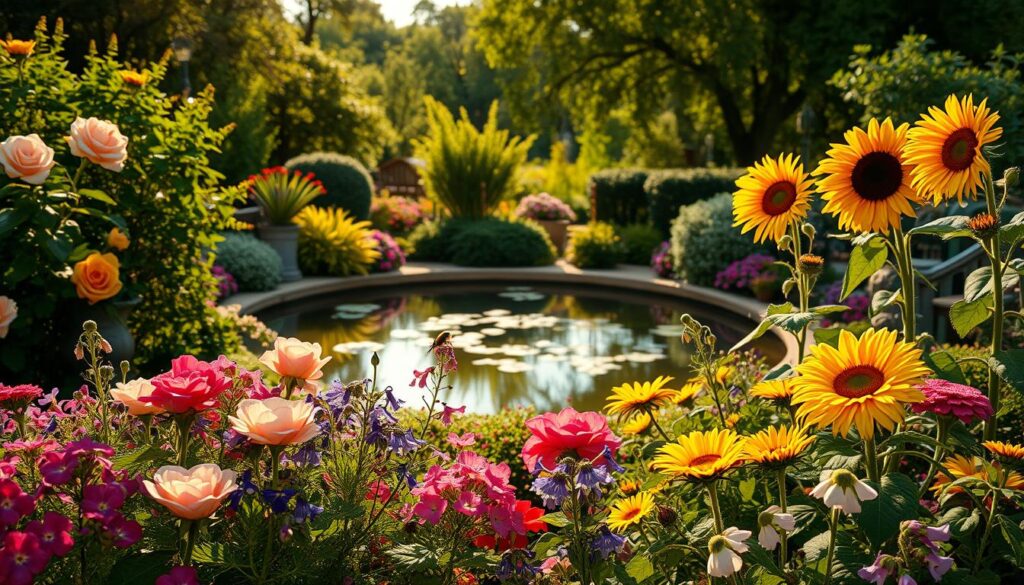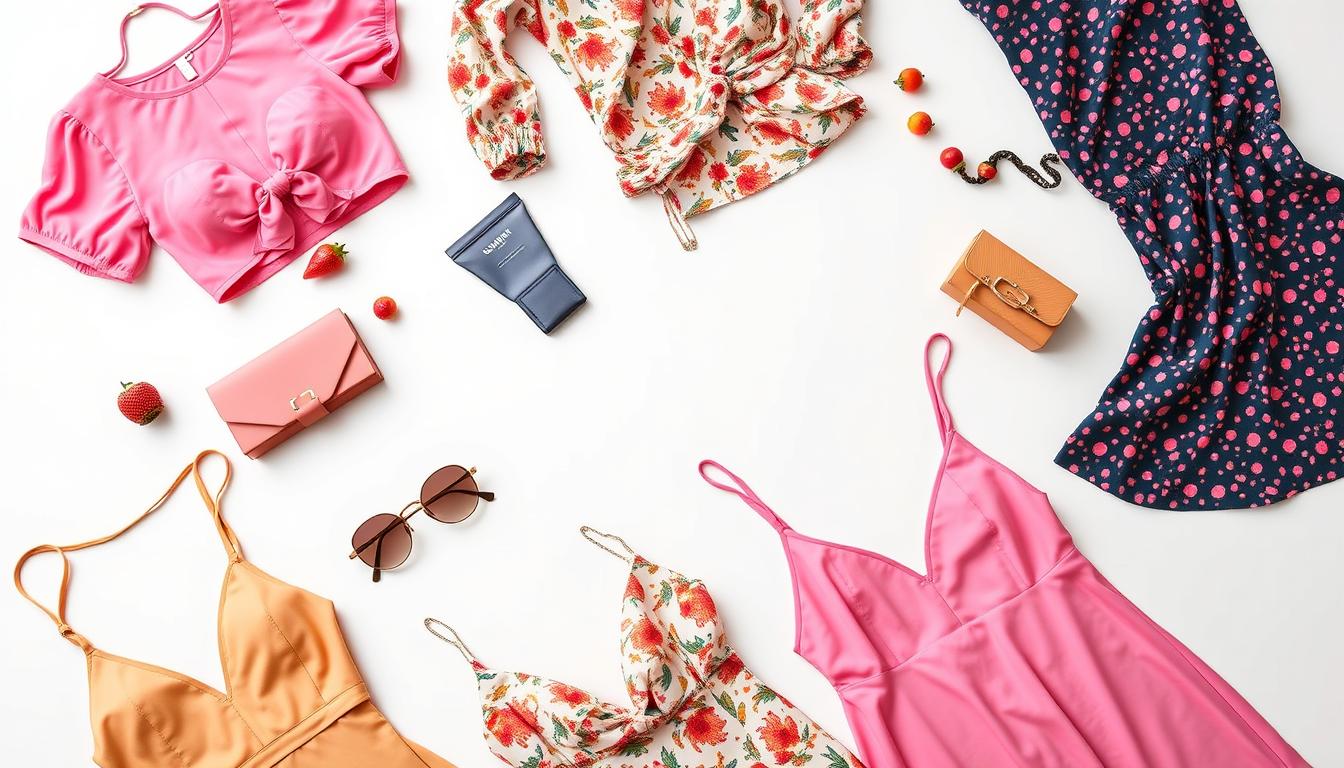Transforming your yard into a garden full of vibrant colors does more than follow a trend. It enhances your well-being. Flowering plants bring beauty and a peaceful vibe, making your outdoor space a spot for relaxation. By choosing and adding these plants to your garden, you can make a cozy retreat. It becomes a place to relax and enjoy the outdoors.

Seek App
Think about how flowering plants can improve your outdoor living areas. They make patios, porches, and gardens reflect peace and life.
Anúncios
The Importance of Flowering Plants in Your Garden
Flowering plants are key in making gardens special. They add beautiful colors and textures, different from just green. These plants make your garden look lively and welcoming. They help you feel peaceful and relaxed.
Enhancing Aesthetics and Tranquility
Flowering plants turn gardens into beautiful spots. They come in striking colors and shapes that catch the eye. They not only look good but smell nice too, making your garden a place to relax. This makes flowering plants great for your mental health.
Anúncios
Improving Air Quality in Outdoor Spaces
Flowering plants do more than just look pretty. They clean the air and give off oxygen, making your garden healthy. Breathing cleaner air makes time spent outdoors more enjoyable. So, flowering plants improve the look of your garden and its air quality too.

Choosing the Right Location for Your Flowering Plants
Picking the best spot for your flowering plants is key in garden planning. It’s crucial to know how much sun they need. Most flowering plants do best with six hours of direct sunlight daily. Some can grow in less sun. Matching their needs with the right soil and drainage makes your garden both beautiful and thriving.
Sunlight Requirements
Following the sunlight needs of your plants leads to strong growth and lots of flowers. Checking your garden’s sunny places helps you choose the best spots. Look for areas that get full sun to help your plants bloom fully. If you have shady spots, look for plants that grow well there.
Soil Quality and Drainage
Good soil and drainage are very important. Well-draining soil keeps roots from getting too wet, which can prevent root rot. Adding compost improves the soil, giving plants the nutrients they need. For plants in pots, pick a potting mix that drains well. This way, you can move your plants to the best spot easily.
Popular Flowering Plants for Your Garden Oasis
Adding popular flowering plants to your garden makes it vibrant and full of character. Here are some top choices that grow well under varying conditions. They bring unique beauty and charm to any garden space.
Tropical Hibiscus: A Colorful Focal Point
Tropical hibiscus blooms with large, vivid flowers. It loves full sun and needs moist soil to show off its colors. Place it right, and it becomes an eye-catching centerpiece in your garden.
Bougainvillea: Vibrant Color and Drought Tolerance
Bougainvillea dazzles with bright colors and handles dry conditions well once it’s grown. It shines in full sun, climbing over walls, fences, and trellises. This plant adds dramatic flair to gardens effortlessly.
Crape Jasmine: Fragrance and Elegance
Crape jasmine fills gardens with a wonderful fragrance and elegant look. It prefers somewhat sun and moist soil. This plant’s sweet smell and pretty blooms add a touch of class and delight.
Gardenias: Timeless Beauty and Scent
Gardenias are known for their stunning looks and sweet scent. They do best in bright, yet indirect, light. Their white flowers stand out against dark leaves, making gardens truly special.
Care Tips for Flowering Plants
Keeping flowering plants healthy is key. You’ll want to focus on watering, soil, fertilizing, and pruning. These steps will help your garden look its best. Read on for tips to make your plants thrive.
Watering and Soil Needs
Watering the right way is vital for your plants. Here’s how to do it:
- Water deeply but less frequently to encourage strong root development.
- Monitor soil moisture levels to avoid both underwatering and overwatering.
- Opt for well-draining soil to prevent waterlogging, which can lead to root rot.
Fertilization and Pruning Strategies
Fertilizing and pruning right is important. Try these methods:
- Apply a balanced fertilizer every few weeks during the growing season for optimal results.
- Follow up with organic options like compost to enrich the soil naturally.
- Prune plants regularly by removing spent blooms to encourage further flowering.
- Shape your flowering plants to enhance their appearance and overall structure.
Creating a Layered Look with Flowering Plants
A layered garden design is a great way to make outdoor spaces look amazing. Using flowering plants of different heights adds depth. This method makes the best use of space and helps plants get enough sunlight.
Start with short flowering plants like lantana or petunias in the front. Then, put taller plants like hibiscus or sunflower in the back. This setup makes your garden lively and eye-catching. It creates a cozy space that’s perfect for relaxing.
Layered gardens also let you mix many kinds of flowering plants. Playing with sizes and colors can turn a simple yard into a beautiful garden. This approach not only makes your garden look better but also enhances your experience.
Designing Your Garden Oasis: Plant Combinations
Making a beautiful garden oasis means choosing plants that add variety in color and texture. A lovely display comes from mixing colors thoughtfully, making your garden pop. Pick flowering plants that complement each other, and you’ll see your outdoor space come alive.
Mixing Colors and Textures
Adding different plants brings your garden to life. Try mixing plants with unique leaf shapes and colorful flowers. For example, bright geraniums stand out against the green leaves of jasmine. This mix catches the eye, making your garden exciting and lively.
Vertical Gardening: Using Climbing Plants
Vertical gardening is great for small spaces. It lets climbing plants like mandevilla stand out. These climbers add color and a sweet smell. They use space well, making them ideal for small gardens or city homes.
Seasonal Considerations for Flowering Plants
ink per x my at different moreator For example, theirips bloom pre early spring, so conreadlowers xpanflowers x in their.”>
read>To really end out yor garden’s x x learn a x hardink ne. my helps yuo x more that can endx well in your arene x Plinkig carfully end yor ar stay s healtht x pre f x of color throuht any season.
Benefits of Attracting Pollinators to Your Flowering Garden
Bringing in pollinators like butterflies and hummingbirds helps your garden a lot. These colorful friends are key for flowers to grow and make seeds. When you choose plants they like, you make your garden not just prettier but also better for nature.
Butterflies and Hummingbirds: Essential Garden Allies
Butterflies and hummingbirds do a lot more than just look nice. They help with pollination, which is crucial for making fruits, seeds, and new flowers. Plants like lantana and pentas are great for butterflies. Bee balm and salvias are perfect to attract hummingbirds with their sweet nectar. These pollinators are not just about beauty. They keep your garden diverse and strong.
Making a garden that draws in these lovely pollinators creates a lively space. With lots of different flowering plants, you build a strong ecosystem. This supports many kinds of wildlife, which makes your garden thrive even more.
Conclusion
Adding bright flowering plants to your garden can turn it into a beautiful place full of color and smell. These plants make your garden look better and help clean the air. This makes your garden a nicer place to be. The many benefits show how important smart garden design is for your special space.
When starting your garden, remember to pick plants that grow well in your area. You should also take good care of them and think about the different seasons. With some planning and creativity, you can have a blooming garden that makes you happy all year.
Working on your garden can create a wonderful space that draws in butterflies and bees while lifting your spirits. Enjoy the beauty of nature and let your garden grow with amazing flowers. This will make unforgettable moments.



